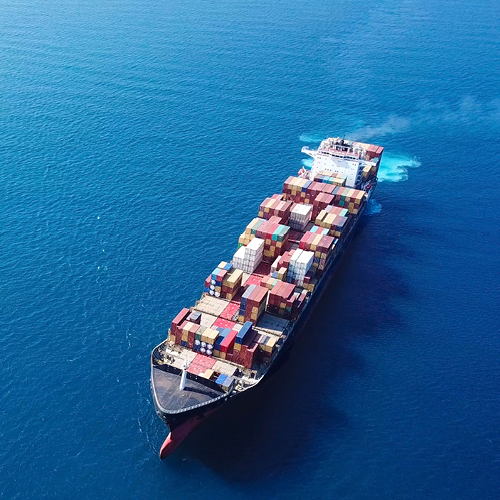THOUGHT LEADERSHIP
CXO Ryan Purvis describes how data is making global shipping safer and the values of remote work.
When you think of saving lives at sea, the life raft, national lifeboat services, and floatation devices spring to mind. These are, hopefully, the last resort; data has the power to prevent the need for a distress call or life raft to be deployed. Ryan Purvis is the Chief Information and Technology Officer (CITO) for HiLo Maritime Risk Management (HiLo), a global organization using data to enable shipping firms to protect one of their most precious cargoes - the crews that sail their ships.
HiLo Maritime Risk Management is a data organization, that collects data sets from major shipping companies and carries out a predictive modelling analysis to pinpoint risks that could lead to major incidents. This data is then shared with over 50 major shipping firms, who are subscribers and supporters of HiLo’s web platform that enables the shipping firm to use the data to protect their crews and vessels. "The goal is to save lives and to avoid critical injuries from a loss of a limb to brain damage," Purvis says of the organization's purpose and a stark reminder of the risks that shipping workers face to put goods in our homes.

"HiLo is a start-up that was born out of a project by the 10 major tanker shipping businesses coming together to increase safety," Purvis says of the international business headquartered in London. Purvis explains that there is a series of different world-wide legislation which govern different types of vessels, which adds to the complexity of the data that HiLo must collect and manage. "Tanker ships have many regulations, and being able to understand those is vitally important," as well as the legislation, HiLo needs to understand the different behaviors of a ship, from how it sails to even what would happen in a worst-case scenario.
"As a not-for-profit organization, HiLo is very well supported by the industry," Purvis says. Founded in 2014 by Shell Shipping, Maritime Maersk Tankers A/S, and the Lloyd's Register Consulting arm, then HiLo became an independent organization in 2018. HiLo remains a small business, though, and as a technology leader, Purvis says his role is more akin to the CTO of a Silicon Valley challenger brand than the big global financial services, professional services, and technology organizations he worked at before. "As with start-ups, you want to do things really quickly, but I'll be honest, it took me a while to 'uncorporatize' my head," he says of the culture shift. "I had always been a multi-hatted type of person, though. And at HiLo I am responsible for information security, internal infrastructure, and the technology products." In that final element to his role, Purvis explains that he works closely with former mariners. "We are dependent on someone that has sat on a vessel and watched the sea and dealt with issues like an engine failure, a fire onboard, or even hijacking incidents."

At the time of the interview, port congestion and delays to the global supply chain are headline news not only in the business press but also national news outlets, and as Purvis describes the challenges that ship captains face in normal times you are reminded of the fine balance that supply chains deliver. "Shipping has been a huge savior for many during the pandemic. Our main concern was the crews on vessels, if they became sick with the COVID-19 then they could be stranded, and that created a lot of stress for them and everyone involved," he says.
As with many sectors, Purvis says the shipping industry became even more focused on its people. "The guys on the vessels today have access to the internet, so they know what is going on at home, so the pandemic has shifted a lot of approaches to the job and people in the industry."
Sailing the Data Wave
HiLo collects data from its members through a cloud-based database using application programming interfaces (APIs). That data is then classified to create a dashboard that clearly understands safety audit information, maintenance records, and even behavioral records, down to the detail of crew members wearing goggles. This understanding of the shipping company can impact whether that operator receives a charter - its classic customer data informing the consumer choice, but on the high seas.
When Purvis joined HiLo in 2018 the business was preparing to sail independently. The business, like so many, had a wealth of Excel spreadsheets in use, and over the last three years, Purvis has moved the organization on to Software-as-a-Service (SaaS) and developed the ML elements in Python that is the defacto technology for AI. "The machine learning has helped speed up the data by reducing lags and will move us towards becoming an expert system for our members."
HiLo has created a highly collaborative environment for their organization and the technology teams of their shipping firms due to their not-for-profit model and specialization by using the Microsoft Azure cloud platform. Like many of his peers, Purvis is concerned about the pipeline of technology talent coming into the industry and has been developing a graduate recruitment program, which is attracting 18-24 year olds into the business.
"The Internet of Things (IoT) is coming and will be a challenge and opportunity for shipping, such as fitting 30 year-old vessels with sensors. And there is a big focus across the industry into autonomous shipping as well as lowering the carbon output of the sector," he says. All of these will generate increasing payloads of data, as well as risks that an organization like HiLo will need to help its customers with.
Digital Nomad
"When I was in banking, they were geo-restricted, despite being international businesses," Purvis says. This experience has fired a passion for demonstrating how technology liberates organizations to work free from any location. "For me, there is not a fixation on face-to-face," he says, adding that as a digital nomad, it is more important to travel and learn so that you can relate to the people you are working with. This passion has led to a podcast - titled “Digital Workspace Works”. "I wanted to write a book, but it takes too long. With a podcast, you find there are lots of people that have the same issues and passions, and I can hear from them how they have dealt with it," he says. And HiLo is an example of the topic Purvis discusses on the podcast; the CITO has colleagues in Czech Republic Greece, India, Singapore, South Africa, and the UK. "Shipping is totally globalized."

Additional Content

ARTICLE
Considering VDI? A Hyperconverged Infrastructure is Your Best Bet for Big ROI

Article
Security in the Covid-19 Era: Do you Have the Right Protocols in Place?







